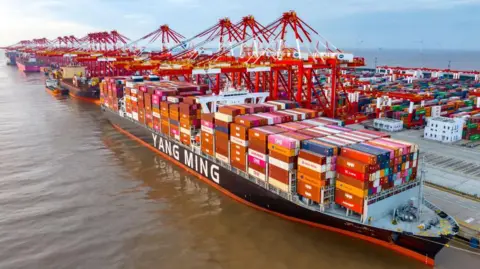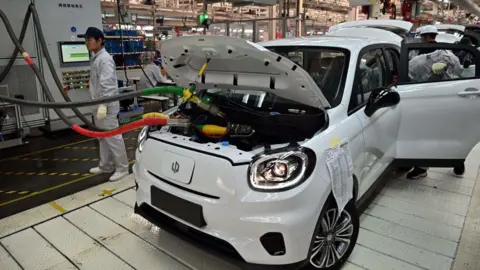
 Getty Images
Getty ImagesInflation, interest rates and tariffs mean 2025 will be an interesting year for the global economy. The International Monetary Fund said it expected growth to remain at a “steady but lackluster” 3.2%. So what does this mean for all of us?
A week before Christmas, millions of U.S. borrowers received a welcome gift – The third consecutive interest rate cut.
However, stocks fell sharply as Fed Chairman Jerome Powell, the world’s most powerful central banker, made it clear that they should not expect further interest rate cuts in 2025 as they had hoped as the fight against inflation continues .
“From now on, this is a new phase and we will be cautious about further cuts,” he said.
In recent years, the COVID-19 epidemic and the war in Ukraine have caused global prices to rise sharply. Although prices are still rising, the growth rate has slowed down significantly.
Still, November saw Inflation pushes up The United States, the Eurozone and the United Kingdom rose to 2.7%, 2.2% and 2.6% respectively. It highlights the difficulties many central banks face in the so-called “last mile” of fighting inflation. Their target is 2%, which may be more achievable if the economy grows.
However, Luis Oganez, head of global macro research at investment bank JPMorgan Chase, said the biggest difficulty for global growth “is uncertainty, and the uncertainty comes from what may happen in the United States under Trump 2.0.”
Since Donald Trump won the November election, he has continued to threaten new tariffs on major U.S. trading partners, China, Canada and Mexico.
“The United States is adopting a more isolationist policy stance and raising tariffs in an attempt to provide more effective protection for U.S. manufacturing,” Oganez said.
“While this will support U.S. growth, at least in the short term, it will certainly hurt many countries that rely on trade with the United States.”
Maurice Obstfeld, former chief economist of the International Monetary Fund and former economic adviser to President Obama, said the new tariffs “could be particularly damaging” to Mexico and Canada but would also be “harmful” to the United States.
He cited the example of the automotive manufacturing industry, which “relies on a supply chain spread across three countries. If that supply chain is disrupted, it will cause huge damage to the automotive market.”
He explained that this has the potential to push up prices, reduce demand for products and hurt company profits, thereby dragging down investment levels.
Mr. Obstfeld, now at the Peterson Institute for International Economics, added: “Introducing such tariffs in a world that relies heavily on trade could harm economic growth and could tip the world into recession.”
The threat of tariffs has also served to compel Resign Canadian Prime Minister Justin Trudeau.
 Getty Images
Getty ImagesAlthough most of the products the U.S. and China sell to each other are Duty has been paid The threat of new tariffs is a major challenge facing the world’s second-largest economy in the year ahead, starting with Donald Trump’s first term.
President Xi Jinping pointed out in his New Year’s message “Challenges brought by uncertainty in the external environment”but said the economy was on an “upward trajectory.”
Its factories export cheap goods that are vital to the Chinese economy. Falling demand as tariffs drive up prices will exacerbate many of the domestic challenges the government is grappling with, including weak consumer spending and business investment.
The World Bank said those efforts were working, and in late December it raised its forecast for China’s economic growth Increased from 4.1% to 4.5% 2025.
Beijing has not yet set a growth target for 2025 but believed it was 5% last year.
“Addressing challenges in the real estate sector, strengthening social safety nets and improving local government finances are critical to achieving a sustained recovery,” said Marla Warwick, World Bank Country Director for China.
Michael Hart, president of the American Chamber of Commerce in China, said these domestic difficulties mean the Chinese government is “more welcoming” of foreign investment.
Rising tensions and tariffs between the United States and China during Biden’s presidency mean some companies have sought to move production elsewhere.
However, Mr. Hart noted that “it took China 30 to 40 years to become such a strong supplier manufacturer” and that “companies have tried to mitigate some of those risks… No one is ready to completely replace China now.”
Electric vehicles are likely to continue to be one of the industries at the center of the global trade war. China produced more than 10 million vehicles last year, a dominance that has led to the United States, Canada and the European Union (EU) levy tariffs on them.
Beijing calls them unfair and is challenging them at the World Trade Organization.
However, what worries the EU is the prospect of tariffs imposed by Donald Trump.
“Trade restrictions and protectionist measures are bad for growth and the ultimate impact on inflation is largely uncertain,” European Central Bank President Christine Lagarde said last month. “(But) in the short term Look, this could be net inflationary.”
Germany and France are the traditional engines of economic growth in Europe. but their poor performance Political instability over the past year means the euro zone is likely to lose momentum in the year ahead despite a recent pickup in economic growth.
That is, unless consumers increase spending and businesses increase investment.
In the UK, rising taxes and wages may also lead to higher prices, According to a survey.
One obstacle to interest rate cuts in the euro zone is that inflation remains at 4.2%. That’s more than double the 2% target, and strong wage pressure has been an obstacle to further declines.
Sander van ‘t Noordende, chief executive of Randstad, the world’s largest recruitment company, said the situation is similar in the United States.
“For example, in the United States, (wage inflation) will still be around 4% in 2024. In some Western European countries, the number is even higher.
“I think there are two factors. One is the scarcity of talent and of course inflation and people demanding more pay for the work they do.”
Vant Nordende added that many companies are passing on these additional costs to customers, adding to upward pressure on headline inflation.
He said the slowdown in the global job market reflected a lack of “dynamism” among businesses and that economic growth was the key to reversing the situation.
“If the economy is doing well, businesses will grow and they’ll start hiring. People will see interesting opportunities and then you’ll start to see people moving around.”
 Getty Images
Getty ImagesDonald Trump will begin his new role in 2025, and a series of economic plans including tax cuts and deregulation may help the US economy continue to prosper.
JPMorgan’s Mr. Oganez said that while he wouldn’t reveal much until he returns to the White House on January 20, “everything suggests that American exceptionalism continues at the expense of the rest of the world.”
He expressed hope that global inflation and interest rates can continue to fall, but warned that “a lot depends on the policies adopted, especially those in the United States.”








